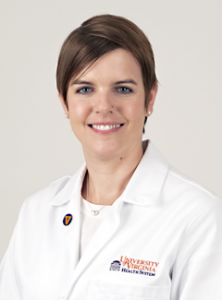Clinical Highlight | Evaluating Patients’ Fitness for Cancer Treatment
CLINICAL HIGHLIGHT/
Division of Hematology & Oncology
Taking Age Out of the Equation — Evaluating a Patients’ Fitness for Cancer Treatment
Geriatric oncologist Erika Ramsdale, MD, was in the middle of a hematology/oncology fellowship when she realized she missed her elderly patients.
“I had a cohort in my residency clinic that was all older women,” Ramsdale says. “They were in their 70s and 80s, with complicated health situations, and when I went into oncology I recognized that I missed working with that population. I liked trying to put everything together for these patients.”
Now, Ramsdale brings these clinical interests together to launch the first Geriatric Oncology Clinic at UVA, utilizing her dual training to provide better care to older patients facing a cancer diagnosis. In this consultation service — the only one of its kind in the state — cancer specialists refer their older patients to Ramsdale, who conducts comprehensive geriatric assessments. Oncologists and surgeons then use the information she generates to guide their clinical decisions.
If cancer is a disease of aging, then the guidelines for treating those over age 65 should be well known, especially given the rapidly aging population in the U.S. Unfortunately that’s not always the case. “There is a dearth of data for older individuals,” says Ramsdale. “We just don’t know exactly how they will react to some cancer treatments.”
Ramsdale will also offer consultations to older cancer patients in rural areas of Virginia who may not be willing or able to travel to UVA. She will train staff to conduct the assessments, and then communicate by phone with the physician to provide personalized recommendations for these patients.
Her work generates new prospective data aimed at understanding outcomes in older patients who may be suffering from heart disease, diabetes, or other health problems that may complicate the cancer diagnosis. She also assesses the impact of issues such as cognitive impairment, poor functional or nutritional status, and psychosocial challenges that can interfere with a patient’s ability to tolerate or manage cancer treatment.
“Our goal is to avoid under treating patients because we have ageist beliefs about who should or should not receive treatment,” Ramsdale says, “but also to avoid over-treating patients who may not tolerate the treatments.”

